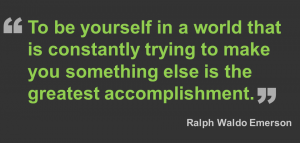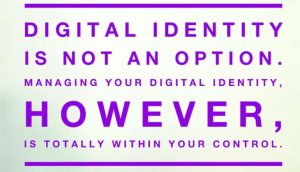Social Media and Your Brand
You’re probably online, which means that you already have a personal brand online. Whether you like it or not, the digital footprints you’re leaving across the Internet help create your personal brand. By being aware and proactive, you can manage that brand. But, if you are being reactive and unaware, it gets managed for you.

The First Rule – “Be Authentic & Thoughtful”
Creating an online personal brand or a personal brand in life, does not mean creating a new made up personality. Again, this is about being authentic – the real you. The internet appears to allow you to be all kinds of people, but be careful, because once it’s out there – it’s out there.
That means there are opportunities and there are threats. You will have a brand online and lots of different people will see what you post – so be thoughtful about what you put online. If you post inappropriate comments or pictures now, a college admissions officer or potential employer may see it several years from now – as would anyone that meets you and wants to know more about you. And this is now on a global scale.
The key is to simply be thoughtful about what you post and consider the immediate impact as well as the impact over time.

Managing Your Online Brand, Basic Guidelines
There is a lot written about how to manage your social media world, so here are a few very basic guidelines. It is worth looking at other sources to learn more or see other perspectives.
1. Post what you really want people to see (and not just in the moment). That sounds pretty simple, but it’s a question of how you create your online presence – not just random pictures, videos or comments. You can think about this as an overall picture of you. Always be authentic.
2. Take Down Anything that it is InappropriateIt’s easy to post a picture or comment that is inappropriate. It might have seemed like a good idea at the time, but on reflection – not so much. Take it down – fast.
3. Don’t Let Your Inside Voice Get Outside. In other words, keep your posts and status updates mostly positive. We all have our dislikes, whether it’s jobs, other people or situations. Think twice before you share those dislikes with the entire world. Social media should not be a venting mechanism.
4. Make Firm Boundaries. There are lots of things you would like to say about yourself and lots of things people might want to know about you. However, it is important to create clear boundaries around what you should keep private. For example:
- Contact information (including your home address)
- Financial information
- Social security number
- Birthdate with birth year (less important, but think about it)
Some people are comfortable sharing more information about themselves than others are, so don’t be overly influenced by the preferences of others. You should be influenced, however, by people who would be affected by what you post, particularly family, peers and girl/boyfriends.
5. If you wonder, “Should I post this?” – Don’t!
Here’s a reality check: when you’re ready to post something online – think whether people you really trust would approve. If they wouldn’t approve, then don’t post it – Or imagine yourself at eighteen applying to college or at twenty-one applying for jobs. Would you want that post out there?

6. Manage your online presence. Your preferences, interests, accomplishments and connections may change, so keep your online presence current. You can also track what others are saying about you as that will affect how others see you (your brand)
